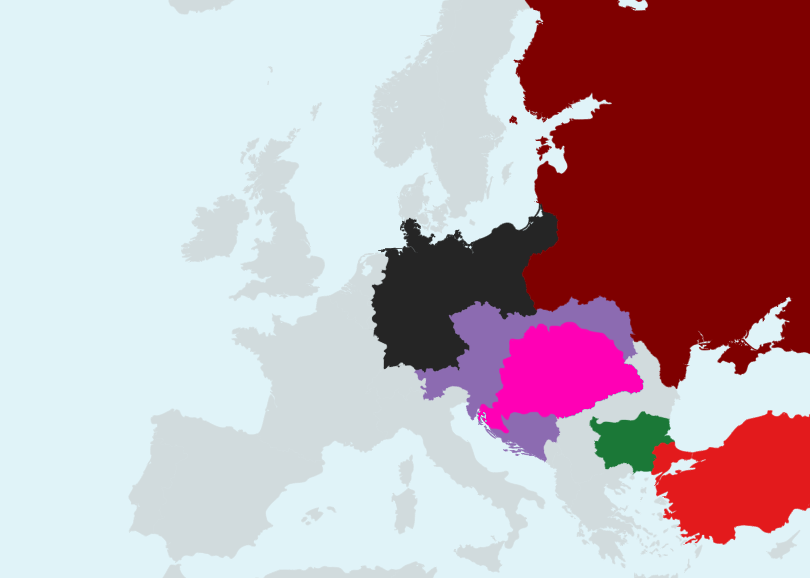Pretense
When Germany asked for an armistice in October 1918, they expected that they could negotiate the end of the war on not-as-harsh terms. Peace had to be negotiated between the countries. These terms would be negotiated between roughly 30 countries at the Paris Peace conferences of 1919. The main representatives were comprised of Italy, the UK, the US, and Fr*nce, who would write almost all of the treaty, the Central Powers had no say in the treaty. Because of the one-sidedness of the conference, they had extremely high demands, stating, "compensation by Germany for all damage done to the civilian population of the Allies and their property by the aggression of Germany by land, by sea and from the air". Many of Germany, not wanting any more bloodshed, was essentially cornered into accepting the treaty.
Terms

Germany was infamously debilitated by the extremely harsh terms of the treaty.
The size of the country was reduced, alsace-lorraine was given back to France, and other lands
were given to Belgium, Denmark, and the newly-established Poland. Germany also had to admit defeat
in the war clause of the treaty.
Military stipulations were also a large part of the treaty; the army was reduced to 100,000 men. Poison gas and airplanes were prohibited
from being manufactured. Parts of Germany had to be completely demilitarized.
Another part that is slightly underlooked is that Germany had to surrender African colonies to the United Kingdom and France, and
Pacific and Chinese colonies to Japan.
Another well known result, or rather infamous was the creation of the League of Nations, an international forum of countries, a precursor
to the ubiquitous United Nations we have today. The United States would never become a member, despite it originally being proposed by
the incompetent Woodrow Wilson. The League of Nations never was a success, and took no steps to stop the rise of Nazi Germany and Imperial Japan.
Despite not being very talked about, Bulgaria was part of the Central Powers in World War I. The Treaty of Neuilly was signed in Late November 1919, and
forced that the Bulgarian army had to shrink to 20,000, and had to give up land to Greece and the now-gone Yugoslavia.
Britannica
These treaties ended fighting between the Central Powers and the Soviet Union in early 1918. Negotiations started on December 22 of 1917. On March 3, after prolonged and
fierce delegation, the Soviets accepted a treaty in which they would lose Finland, the baltics, and the short-lived 1910s Ukraine.
Brittanica
The treaty of Sèvres was the first of two treaties between the Allied powers and the new Turkish government. The first treaty called Turkey to lose their areas in Arab Asia,
an independent Armenia, and to give up land to Greece. This treaty was rejected and replaced by the Treaty of Lausanne, which defines modern borders of Turkey to this day.
Brittanica x2
After a few years of political instability and revolution, Hungary received a treaty, which was possibly the harshest treaty in terms of land loss.
Hungary lost about two-thirds of their land by treaty terms, including the loss of Slovakia, Western Hungary was given to Austria, Croatia-Slovenia was given to Yugoslavia.
Romania received Transylvania, and Italy received Fiume. And after all this, Hungary's army was reduced to 35,000.
Britannica
This treaty was signed at Saint-Germain-en-Laye in France. This treaty marked the end of the long reign of the Habsburg, officially recognizing the states of Czechoslovakia, Poland, Hungary, and Yugoslavia.
Additional land was ceded, including Trento, East Galicia, South Tirol, Trieste, and Istria. The navy was disbanded and the army was forced to remain at 20,000.
Brittanica
Germany
League of Nations
Treaty of Neuilly / Bulgaria
Treaties of Brest-Litovsk / Soviet Union (Russia)
Treaty of Sèvres and Lausanne / Turkey
Treaty of Trianon / Hungary
Treaty of Saint-Germain / Austria
Consequences
Due to the immense pressure of reparations, Germany had to print high volumes of money to pay their workers, causing an economic crisis. After the economy Germany recovered, it collapsed again due to the great depression. This, combined with the said humiliation of the guilt clause, caused the rise of the totalitarian Nazi party to take over Germany, which caused World War II and an unprecedented death toll.